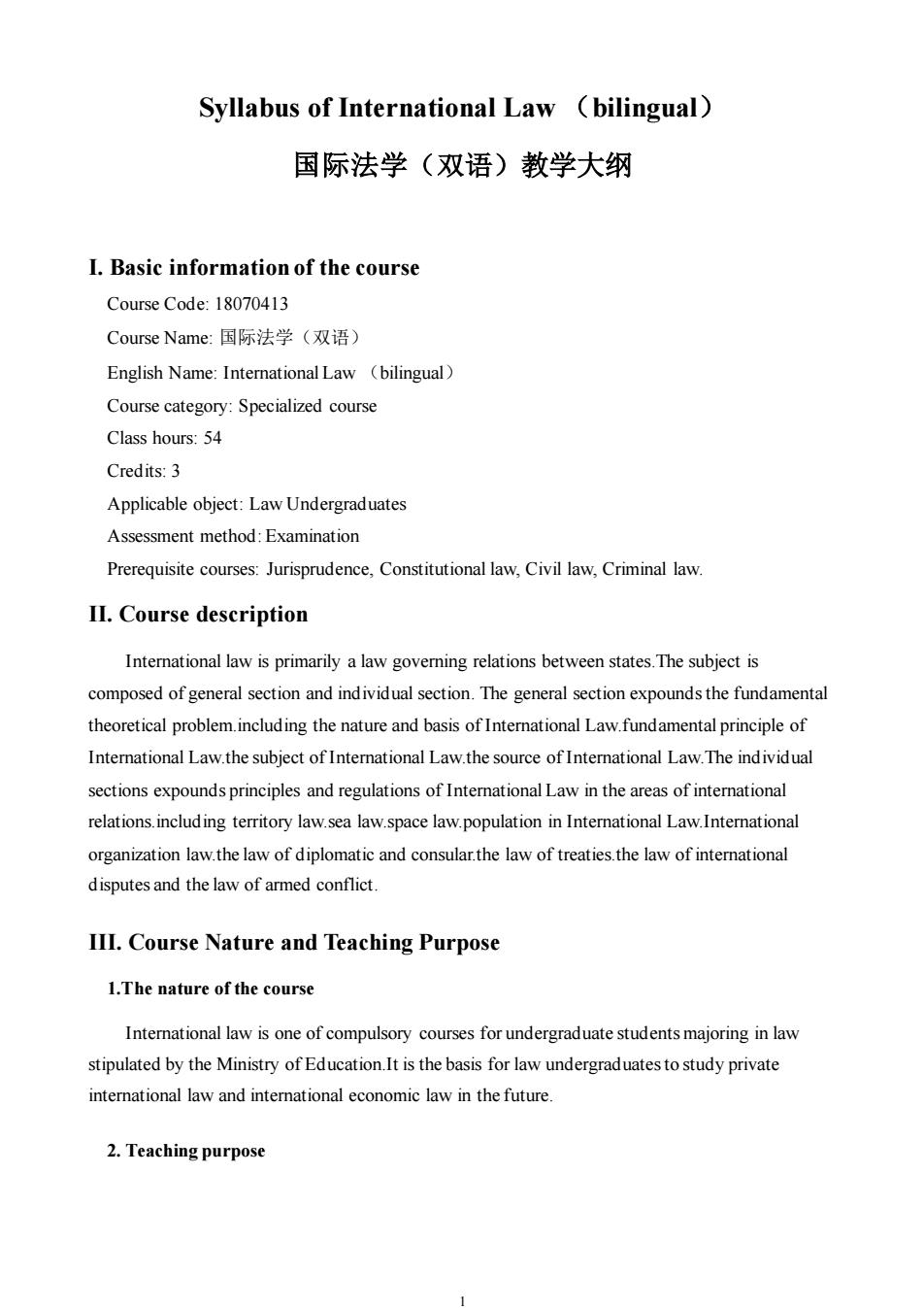
Syllabus of International Law (bilingual) 国际法学(双语)教学大纲 I.Basic information of the course Course Code:18070413 Course Name:国际法学(双语) English Name:International Law (bilingual Course category:Specialized course Class hours:54 Credits:3 Applicable object:Law Undergraduates Assessment method:Examination Prerequisite courses:Jurisprudence,Constitutional law,Civil law,Criminal law. II.Course description Intemational law is primarily a law goveming relations between states.The subject is composed of general section and individual section.The general section expoundsthe fundamental theoretical problem.including the nature and basis of Intemational Law.fundamental principle of Intemational Law.the subject of Interational Law.the source of Intemational Law.The individual sections expounds principles and regulations of Intemational Law in the areas of intemational relations.including territory law.sea law.space law.population in International Law.International organization law.the law of diplomatic and consular.the law of treaties.the law of interational disputes and the law of armed conflict III.Course Nature and Teaching Purpose 1.The nature of the course International law is one of compulsory courses for undergraduate students majoring in law stipulated by the Ministry of Education.It is the basis for law undergraduatesto study private international law and intemational economic law in the future 2.Teaching purpose
1 Syllabus of International Law (bilingual) 国际法学(双语)教学大纲 I. Basic information of the course Course Code: 18070413 Course Name: 国际法学(双语) English Name: International Law (bilingual) Course category: Specialized course Class hours: 54 Credits: 3 Applicable object: Law Undergraduates Assessment method: Examination Prerequisite courses: Jurisprudence, Constitutional law, Civil law, Criminal law. II. Course description International law is primarily a law governing relations between states.The subject is composed of general section and individual section. The general section expounds the fundamental theoretical problem.including the nature and basis of International Law.fundamental principle of International Law.the subject of International Law.the source of International Law.The individual sections expounds principles and regulations of International Law in the areas of international relations.including territory law.sea law.space law.population in International Law.International organization law.the law of diplomatic and consular.the law of treaties.the law of international disputes and the law of armed conflict. III. Course Nature and Teaching Purpose 1.The nature of the course International law is one of compulsory courses for undergraduate students majoring in law stipulated by the Ministry of Education.It is the basis for law undergraduates to study private international law and international economic law in the future. 2. Teaching purpose
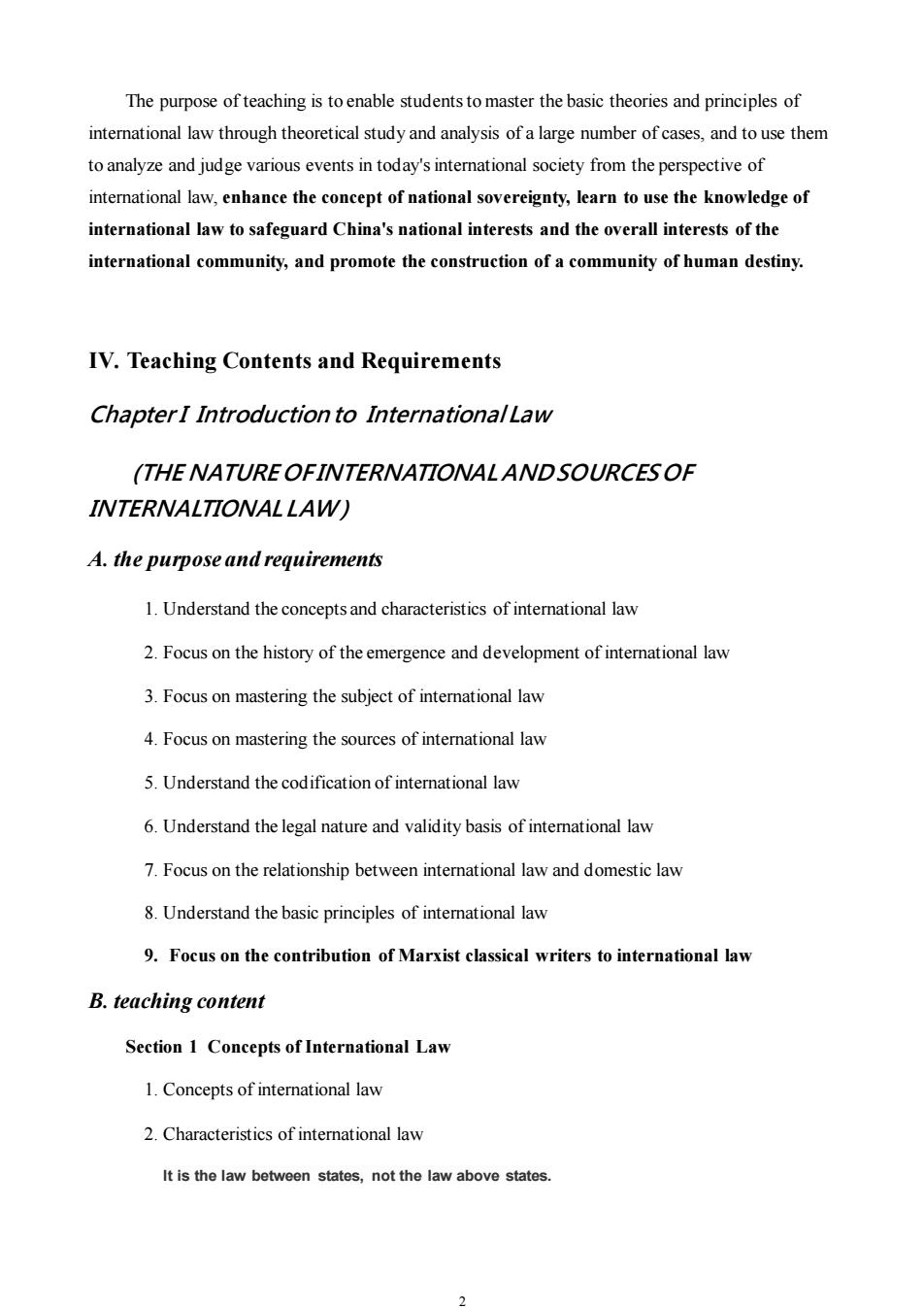
The purpose of teaching is toenable students to master the basic theories and principles of international law through theoretical study and analysis of a large number of cases,and to use them to analyze and judge various events in today's international society from the perspective of international law,enhance the concept of national sovereignty,learn to use the knowledge of international law to safeguard China's national interests and the overall interests of the international community,and promote the construction of a community of human destiny. IV.Teaching Contents and Requirements ChapterI Introduction to InternationalLaw (THE NATURE OFINTERNATIONAL ANDSOURCESOF INTERNALTTONAL LAW) A.the purpose and requirement 1.Understand the concepts and characteristics of international law 2.Focus on the history of the emergence and development of international law 3.Focus on mastering the subject of intemational law 4.Focus on mastering the sources of intemational law 5.Understand the codification of intemational law 6.Understand the legal nature and validity basis of intemational law 7.Focus on the relationship between interational law and domestic law 8.Understand the basic principles of intemational law 9.Focus on the contribution of Marxist classical writers to international law B.teaching content Section 1 Concepts of International Law 1.Concepts of international law 2.Characteristics of international law It is the law between states,not the law above states
2 The purpose of teaching is to enable students to master the basic theories and principles of international law through theoretical study and analysis of a large number of cases, and to use them to analyze and judge various events in today's international society from the perspective of international law, enhance the concept of national sovereignty, learn to use the knowledge of international law to safeguard China's national interests and the overall interests of the international community, and promote the construction of a community of human destiny. IV. Teaching Contents and Requirements Chapter I Introduction to International Law (THE NATURE OF INTERNATIONAL AND SOURCES OF INTERNALTIONAL LAW ) A. the purpose and requirements 1. Understand the concepts and characteristics of international law 2. Focus on the history of the emergence and development of international law 3. Focus on mastering the subject of international law 4. Focus on mastering the sources of international law 5. Understand the codification of international law 6. Understand the legal nature and validity basis of international law 7. Focus on the relationship between international law and domestic law 8. Understand the basic principles of international law 9. Focus on the contribution of Marxist classical writers to international law B. teaching content Section 1 Concepts of International Law 1. Concepts of international law 2. Characteristics of international law It is the law between states, not the law above states
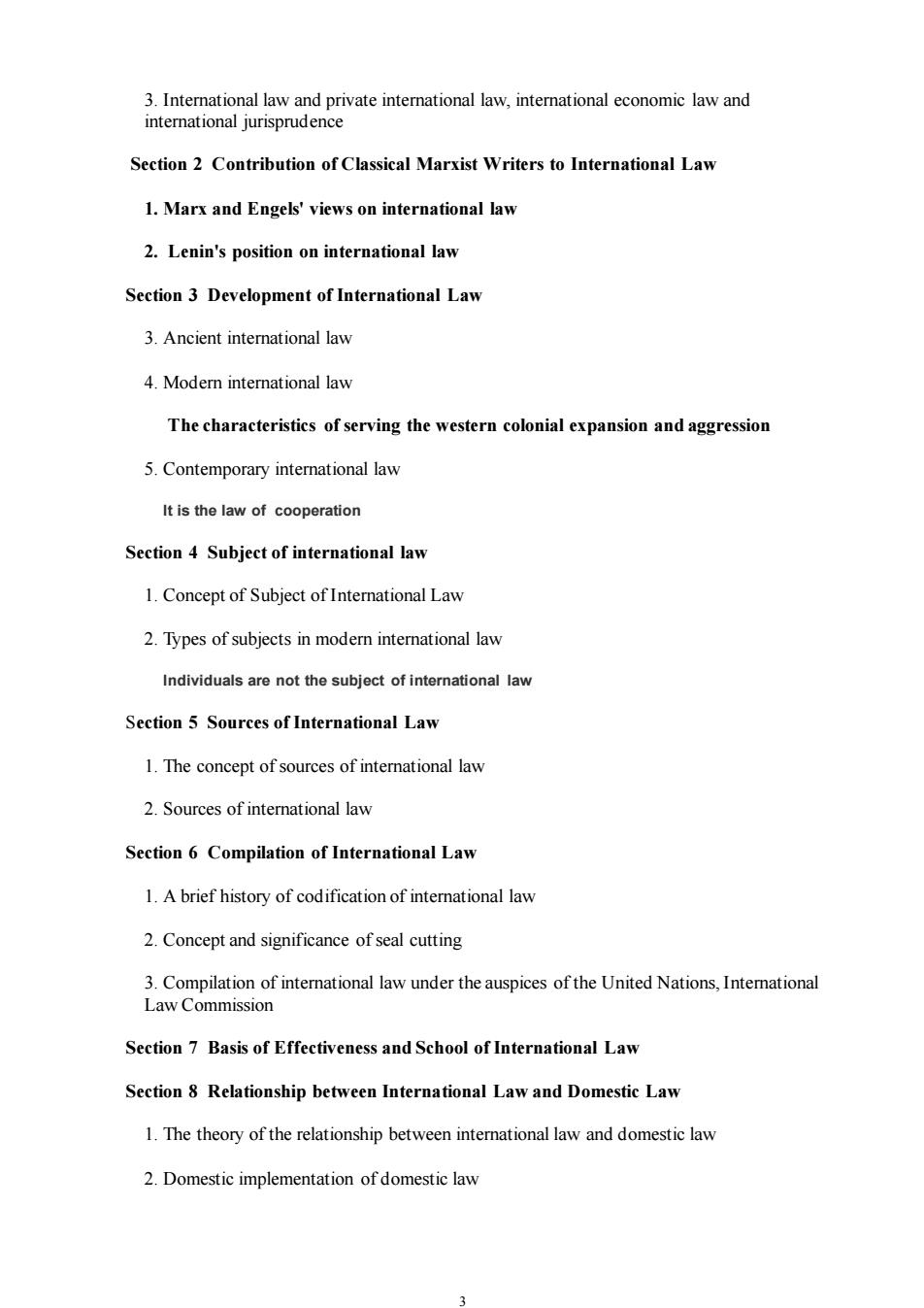
3.International law and private international law,interational economic law and international jurisprudence Section 2 Contribution of Classical Marxist Writers to International Law 1.Marx and Engels'views on international law 2.Lenin's position on international law Section 3 Development of International Law 3.Ancient intemational law 4.Modern intemational law The characteristics of serving the western colonial expansion and aggression 5.Contemporary international law It is the law of cooperation Section 4 Subject of international law 1.Concept of Subject of International Law 2.Types of subjects in modem international law Individuals are not the subiect of international law Section 5 Sources of International Law 1.The concept of sources of international law 2.Sources of international law Section 6 Compilation of International Law 1.A brief history of codification of interational law 2.Concept and significance of seal cutting Law Commission Section 7 Basis of Effectiveness and School of International Law Section 8 Relationship between International Law and Domestic Law 1.The theory of the relationship between international law and domestic law 2.Domestic implementation of domestic law
3 3. International law and private international law, international economic law and international jurisprudence Section 2 Contribution of Classical Marxist Writers to International Law 1. Marx and Engels' views on international law 2. Lenin's position on international law Section 3 Development of International Law 3. Ancient international law 4. Modern international law The characteristics of serving the western colonial expansion and aggression 5. Contemporary international law It is the law of cooperation Section 4 Subject of international law 1. Concept of Subject of International Law 2. Types of subjects in modern international law Individuals are not the subject of international law Section 5 Sources of International Law 1. The concept of sources of international law 2. Sources of international law Section 6 Compilation of International Law 1. A brief history of codification of international law 2. Concept and significance of seal cutting 3. Compilation of international law under the auspices of the United Nations, International Law Commission Section 7 Basis of Effectiveness and School of International Law Section 8 Relationship between International Law and Domestic Law 1. The theory of the relationship between international law and domestic law 2. Domestic implementation of domestic law
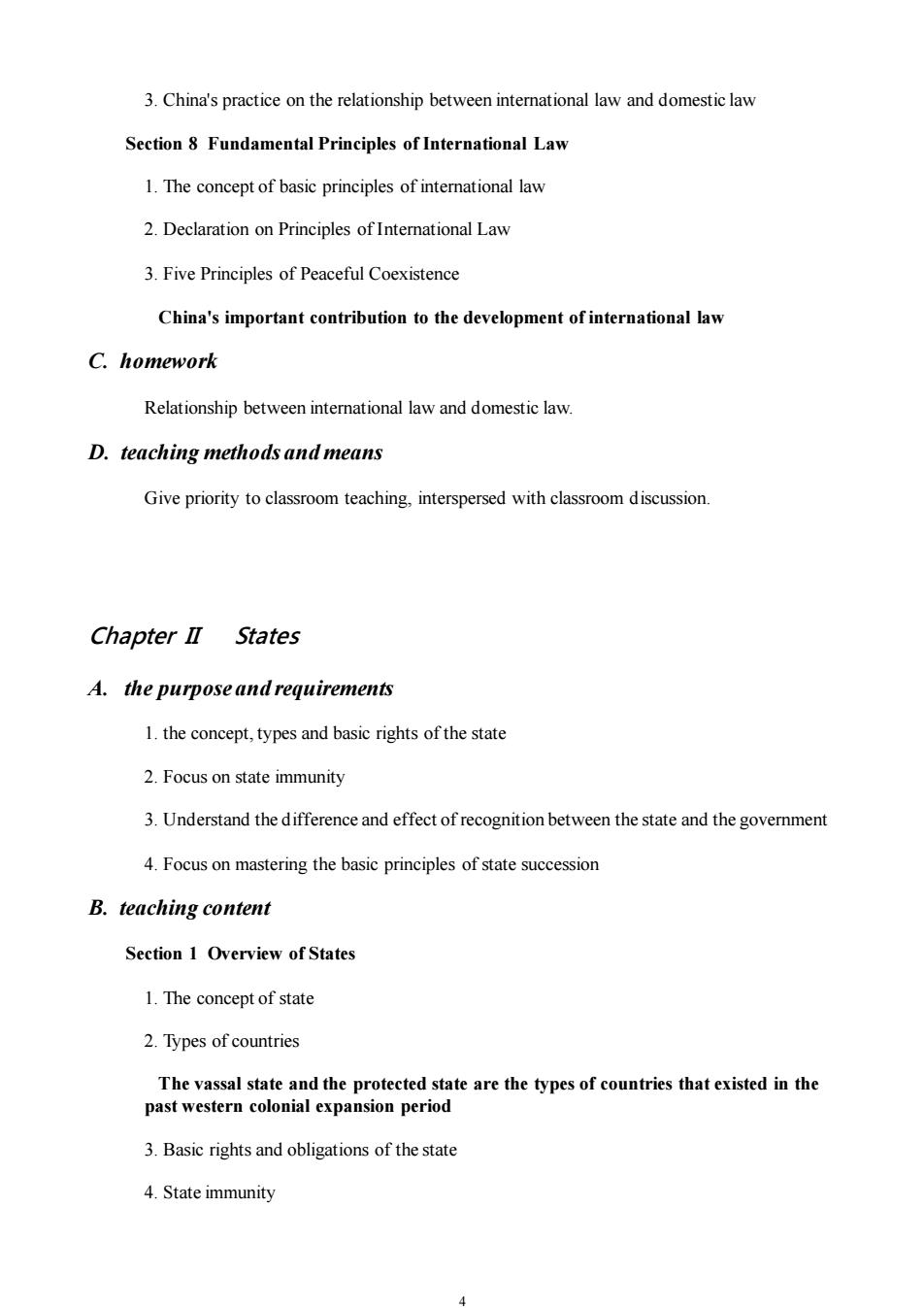
3.China's practice on the relationship between international law and domestic law Section 8 Fundamental Principles of International Law 1.The concept of basic principles of international law 2.Declaration on Principles of Intemnational Law 3.Five Principles of Peaceful Coexistence China's important contribution to the development of international law C.homework Relationship between international law and domestic law. D.teaching methods and means Give priority to classroom teaching,interspersed with classroom discussion. ChapterⅡStates A.the purpose and requirements 1.the concept,types and basic rights of the state 2.Focus on state immunity 3.Understand the difference and effect of recognition between the state and the goverment 4.Focus on mastering the basic principles of state succession B.teaching content Section 1 Overview of States 1.The concept of state 2.Types of countries The vassal state and the the types of existed inthe past western colonial expansion period 3.Basic rights and obligations of the state 4.State immunity
4 3. China's practice on the relationship between international law and domestic law Section 8 Fundamental Principles of International Law 1. The concept of basic principles of international law 2. Declaration on Principles of International Law 3. Five Principles of Peaceful Coexistence China's important contribution to the development of international law C. homework Relationship between international law and domestic law. D. teaching methods and means Give priority to classroom teaching, interspersed with classroom discussion. Chapter II States A. the purpose and requirements 1. the concept, types and basic rights of the state 2. Focus on state immunity 3. Understand the difference and effect of recognition between the state and the government 4. Focus on mastering the basic principles of state succession B. teaching content Section 1 Overview of States 1. The concept of state 2. Types of countries The vassal state and the protected state are the types of countries that existed in the past western colonial expansion period 3. Basic rights and obligations of the state 4. State immunity
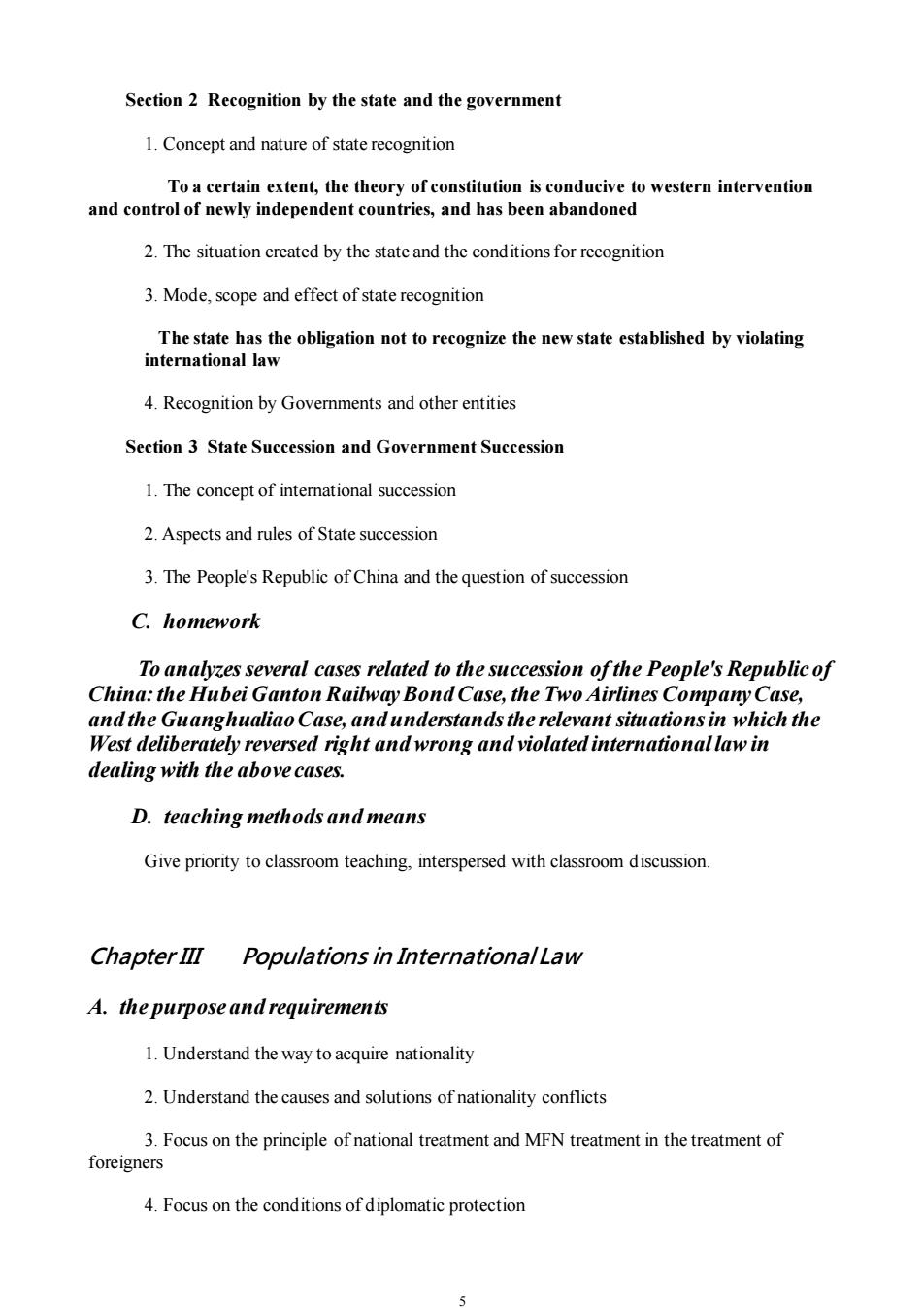
Section 2 Recognition by the state and the government 1.Concept and nature of state recognition To a certain extent,the theory of constitution is conducive to western intervention and control of newly independent countries,and has been abandoned 2.The situation created by the state and the conditions for recognition 3.Mode,scope and effect of state recognition The state has the obligation not to recognize the new state established by violating international law 4.Recognition by Goverments and other entities Section 3 State Succession and Government Succession 1.The concept of international succession 2.Aspects and rules of State succession 3.The People's Republic of China and the question of succession C.homework To analyzes several cases related to the succession of the People's Republic of China:the Hubei Ganton Railway Bond Case,the Two Airlines Company( Case, and the Guanghualiao Case,and understands the relevant situations in which the West deliberately reversed right and wrong and violated international law in dealing with the above cases. D.teaching methods and means Give priority to classroom teaching,interspersed with classroom discussion Chapter III Populations in InternationalLaw A.the purpose and requirements 1.Understand the way to acquire nationality 2.Understand the causes and solutions of nationality conflicts 3.Focus on the principle of national treatment and MFN treatment in the treatment of foreigners 4.Focus on the conditions of diplomatic protection
5 Section 2 Recognition by the state and the government 1. Concept and nature of state recognition To a certain extent, the theory of constitution is conducive to western intervention and control of newly independent countries, and has been abandoned 2. The situation created by the state and the conditions for recognition 3. Mode, scope and effect of state recognition The state has the obligation not to recognize the new state established by violating international law 4. Recognition by Governments and other entities Section 3 State Succession and Government Succession 1. The concept of international succession 2. Aspects and rules of State succession 3. The People's Republic of China and the question of succession C. homework To analyzes several cases related to the succession of the People's Republic of China: the Hubei Ganton Railway Bond Case, the Two Airlines Company Case, and the Guanghualiao Case, and understands the relevant situations in which the West deliberately reversed right and wrong and violated international law in dealing with the above cases. D. teaching methods and means Give priority to classroom teaching, interspersed with classroom discussion. Chapter III Populations in International Law A. the purpose and requirements 1. Understand the way to acquire nationality 2. Understand the causes and solutions of nationality conflicts 3. Focus on the principle of national treatment and MFN treatment in the treatment of foreigners 4. Focus on the conditions of diplomatic protection